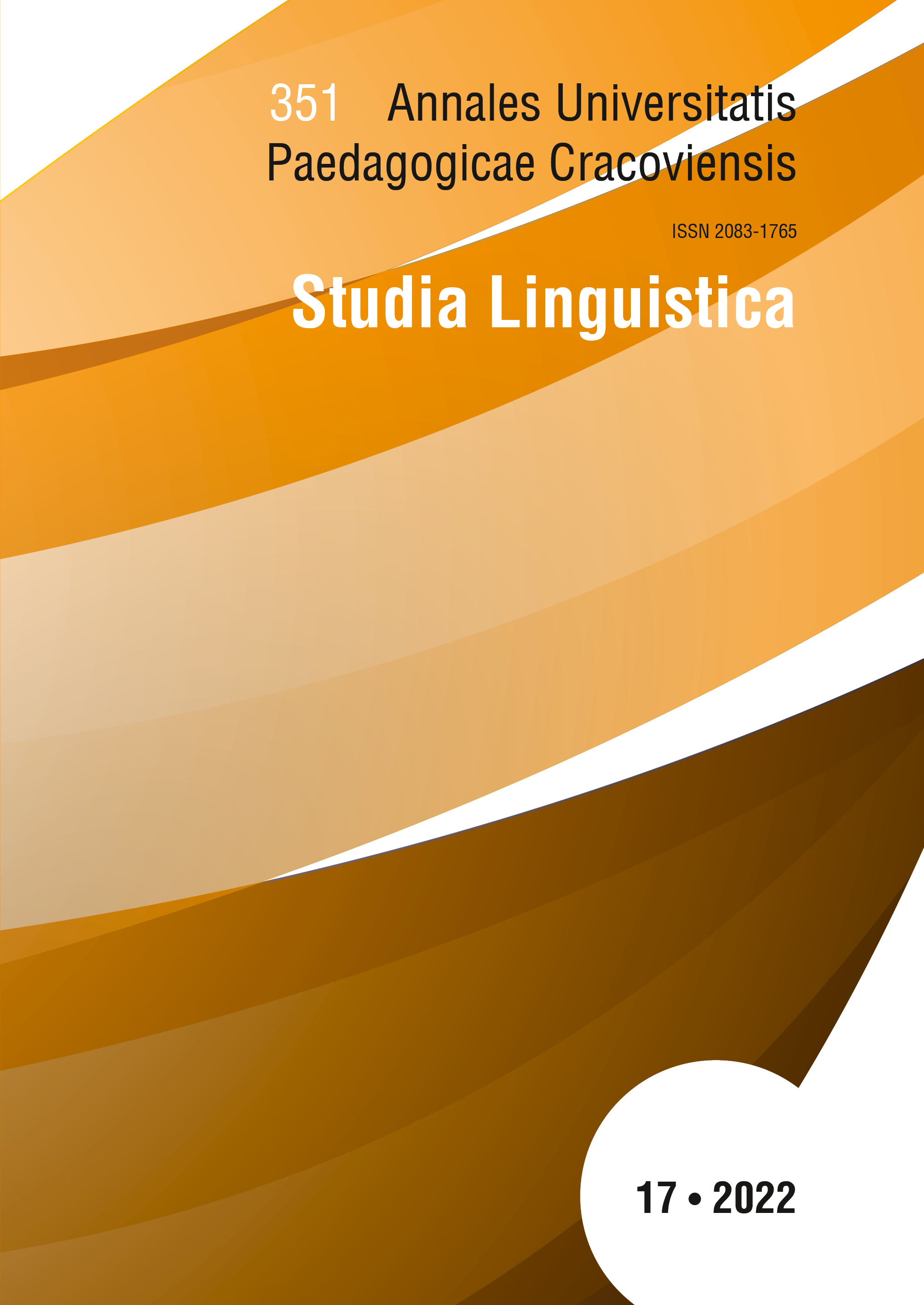Us and Them: On linguistic exponents expressing teacher attitudes toward foreign students in the light of critical discourse analysis
Main Article Content
Abstract
The following study utilises the data from a larger project (Rokita-Jaśkow et al., 2022) with a view to analysing the way in which EFL teachers describe their encounters with multilingual learners in their monolingual classes within critical discourse analysis framework and positioning theory. The analysis showed that the teachers studied position themselves and their students in relation to the newcomers differently depending on the language(s) they speak. The Us and Others distinction was more prominent in relation to English-speaking return migrant children, whom they positioned higher than their monolingual Polish students, and with whom they often struggled to maintain equal, if not superior position. Conversely, other multilinguals were positioned on the same level as Polish learners, yet subordinate to the teacher’s dominant role. It is concluded that such positioning, though marks inclusivity, signals persistent power relations in the educational setting, which may counteract integration of multilinguals.
Downloads
Article Details

This work is licensed under a Creative Commons Attribution-NonCommercial-NoDerivatives 4.0 International License.
Author, submitting a text to the editorial board of the journal “Annales Universitatis Paedagogicae Cracoviensis. Studia Linguistica", certifies that the content of the article has not been published so far and that the work does not violate in any way the copyright or related rights of other person, as well as other rights of third parties, and that no one's rights to the work (or any part thereof) have been missed. After signing the contract, the property rights to the published materials are transferred to the University of the National Education Commission, Krakow.
“Annales Universitatis Paedagogicae Cracoviensis. Studia Linguistica” is an open access journal, and all its content is made available free of charge to users and institutions under the Creative Commons CC-BY-NC-ND 4.0 license (attribution, non-commercial use, no derivative works). Under this license, the authors agree that their work may be lawfully reused for any purpose, except for commercial purposes, without the prior consent of the author or publisher. Everyone can read, download, copy, print, distribute and process these works, provided that the author's marking and the original publication place are correct. Published texts may not be used to create derivative works (e.g. to translate and publish in another language without the consent of the publisher). This is in line with the BOAI (Budapest Open Access Initiative) definition. "Studia Linguistica" does not charge for submitting or processing articles.
References
Bernstein K.A., 2020, (Re)defining success in language learning. Positioning, participation and young emergent bilinguals at school, Bristol.
Google Scholar
Cap P., 2017, The Language of Fear. Communicating threat in public discourse, London.
Google Scholar
Chovanec J., Mołek-Kozakowska K. (red.), 2017, Representing the Other in European Media Discourses, Amsterdam.
Google Scholar
Davies B., Harre R., 1990, Positioning: the discursive production of selves, ,,Journal for the Theory of Social Behavior”, 20, s. 43–63.
Google Scholar
Duszak A. (red.), 2002, US and Others, Social Identities Across Languages, Discourses and Cultures, Amsterdam.
Google Scholar
Duszak A., Fairclough N., 2008, Krytyczna analiza dyskursu. Interdyscyplinarne podejście do komunikacji społecznej, Kraków.
Google Scholar
Główny Urząd Statystyczny, 2020, Sytuacja demograficzna Polski do 2019 r. Migracje zagraniczne ludności w latach 2000–2019, Warszawa, online: https://stat.gov.pl (dostęp 2.11.2021).
Google Scholar
Grabias S., 2019, Język w zachowaniach społecznych. Podstawy socjolingwistyki i logopedii, Lublin.
Google Scholar
Harré R., 2015, Positioning theory. The Wiley Handbook of Theoretical and Philosophical Psychology: Methods, Approaches, and New Directions for Social Sciences, London.
Google Scholar
Hayriye Kayi-Aydar, 2021, A framework for positioning analysis: From identifying to analyzing (pre)positions in narrated story lines, „System”, 102, https://doi.org/10.1016/j.system.2021.102600 (dostęp 2.11.2021).
Google Scholar
Kawamoto Y., 2021, Relacja na ty w świetle tekstów z narodowego korpusu języka polskiego, „Socjolingwistyka”, 35, s. 303–317, http://dx.doi.org/10.17651/SOCJOLING.35.17 (dostęp 2.03.2022).
Google Scholar
Kayi-Aydar H., Miller E.R., 2018, Positioning in classroom discourse studies: A state-of- the-art review, ,,Classroom Discourse”, 9, s. 79–94, https://doi.org/10.1080/19463014.2018.1450275 (dostęp 2.11.2021).
Google Scholar
Malinowska E., 2013, Językowe wykładniki władzy w urzędzie, „Oblicza komunikacji”, 6, s. 39–46, https://wuwr.pl/okom/article/view/3230 (dostęp 2.11.2021).
Google Scholar
Najwyższa Izba Kontroli, 2020, Kształcenie dzieci rodziców powracających do kraju oraz dzieci cudzoziemców, https://www.nik.gov.pl/kontrole/P/19/028/ (dostęp 2.11.2021).
Google Scholar
Pavlenko A., 2002, Poststructuralist approaches to the study of social factors in second language learning and use, [w:] Portraits of the L2 User, red. V. Cook, Clevedon, s. 275–302.
Google Scholar
Przybylska R., 2021, Słowa pochwały – o semantyce pewnych przymiotników oceniających, „Annales Universitatis Paedagogicae Cracoviensis. Studia Linguistica”, 16, s. 156–165, https://doi.org/10.24917/20831765.16.13.
Google Scholar
Puzynina J., 1986, O elementach ocen w strukturze znaczeniowej wyrazów, „Biuletyn PTJ” XL, s. 121–128.
Google Scholar
Rokita-Jaśkow J., Wolanin A., Król-Gierat W., Nosidlak K., 2022, Bridging the ‘dual lives’: school socialization of young bi-/multilinguals in the eyes of EFL teachers. „International Journal of Bilingual Education and Bilingualism”, https://doi.org/10.1080/13670050.2022.2114788.
Google Scholar
Ruiz R., 1984, Orientations in language planning, „NABE Journal”, nr 8, s. 15–34.
Google Scholar
Skowronek B., 2016, Współczesny dyskurs polityczny a zjawisko nowomowy, „Annales Universitatis Paedagogicae Cracoviensis. Studia Linguistica”, 11, s. 110–118, https://studialinguistica.up.krakow.pl/article/view/5165.
Google Scholar
Weber J.-J., Horner K., 2008, Introducing multilingualism. A social approach, London.
Google Scholar
Werbińska D., 2020, Language teacher positioning in a teacher promotion examination: a small story approach, „Neofilolog”, 54, s. 133–153, https://doi.org/10.14746/n.2020.54.1.8.
Google Scholar
